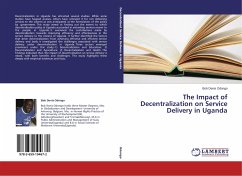The bastion of the birth of Decentralization in Uganda no doubt created a sense of hopefulness in the previously hopeless citizenry whose mandate to take charge of their own affairs had been usurped by the previous regimes. The positive fascinations of people s participation, closer service delivery, end of bureaucracy and local accountability were believed to be a renaissance for the people of Uganda and their country. With the passage of time, however, the central government began to interfere with local politics by re-centralizing power and accountability, appointing key authorities in LGs, and subdividing or completely taking over some LGs; all of which (have) led to the collapse of the original philosophical underpinnings of Decentralization in Uganda. As a result, the future of Decentralization and LGs in Uganda is increasingly becoming bleak as their structures appear fragile and withering. As Chinua Achebe observed, when the centre fails to hold, things fall apart . The centre, therefore, needs to get back on the drawing board, and set back LGs and the Decentralization Policy to their original plan; otherwise their future in Uganda will end up in a state of oblivion.
Bitte wählen Sie Ihr Anliegen aus.
Rechnungen
Retourenschein anfordern
Bestellstatus
Storno








